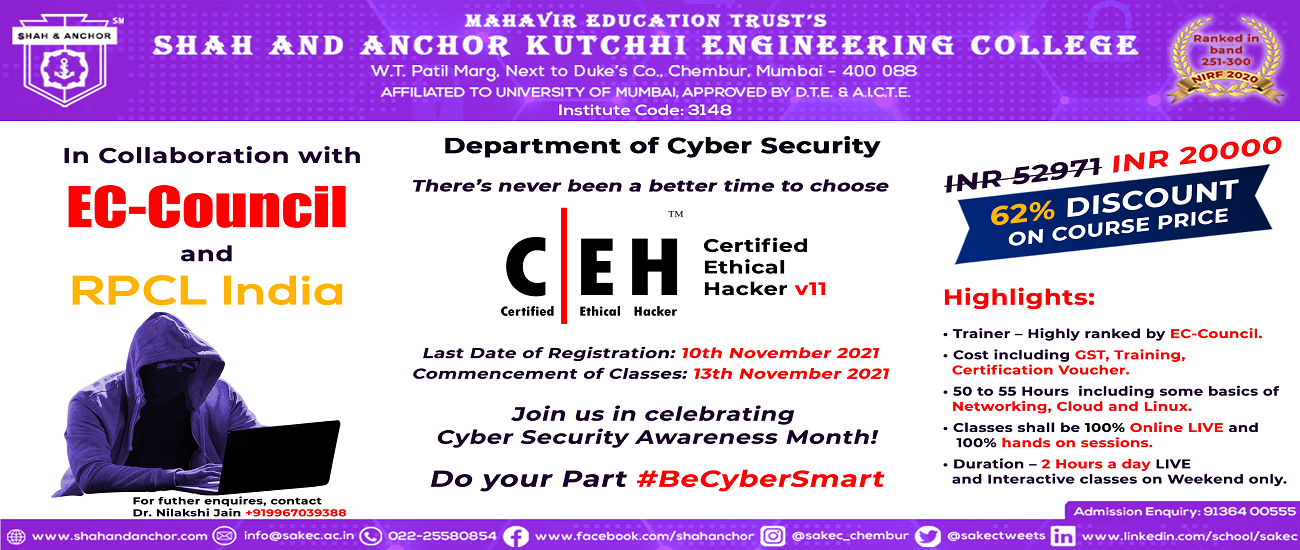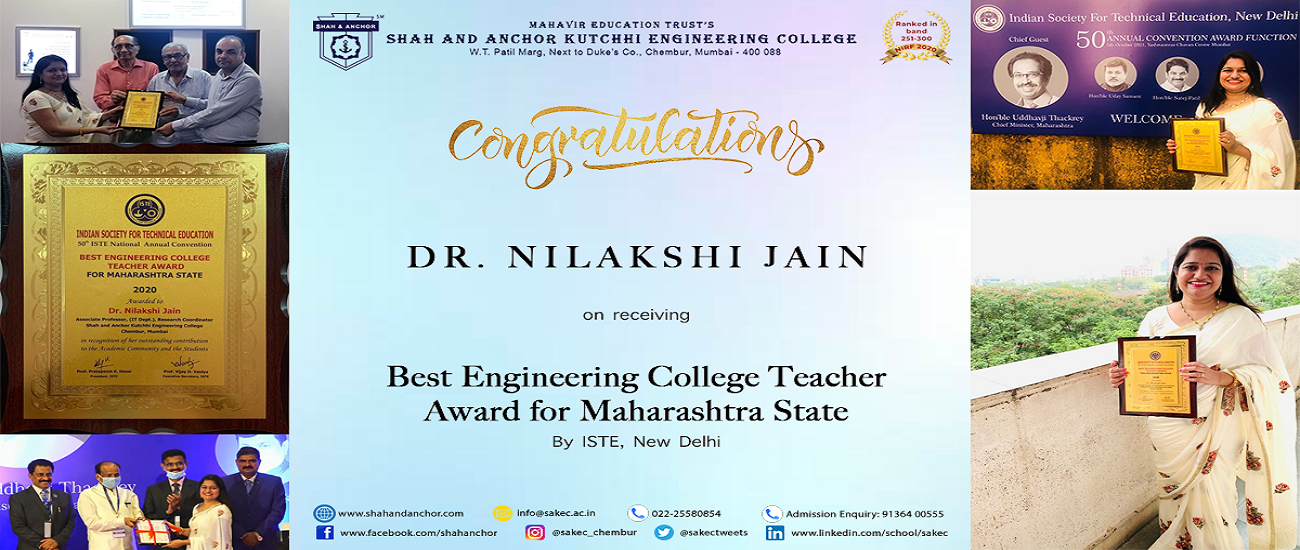Our Vision
● To be a high repute focused department preparing students ethically in field of cyber security and make them capable to lead technical, economic, social and ethical development of the society.
Our Mission
● To provide an academic environment for the development by providing training and skill development to build knowledge, skills, values, and confidence to take a leadership role in the field of Cyber Security.
● To cultivate research and entrepreneurship culture resulting in knowledge and innovative technologies that contributes to sustainable development of the society.
●To enhance academic and corporate collaborations.
About Department

Dr. Nilakshi Jain
I/c Head of Department Ph.D. (Faculty of Computer Engineering – Digital Forensic) Teaching Experience: 11 Years Area of Specialization:Digital Forensic, Cyber Security, Artificial Intelligence."True Cyber Security is to prepare what’s NEXT , not what was LAST." -Neil Rerup
The key factor in today's techno-savvy society is Education & knowledge is the greatest strength with which every nation progresses. SAKEC recognizes the need for this learning and in order to create a cyber secure world , “Cyber Security Department'' came into existence in the year 2020 with initial intake of 60.
Cyber security is the field that focuses on protecting networks, companies, and individuals from attacks. Cyber-attacks can include unauthorized access, viruses, spyware, spam, botnets, phishing scams, and more. In other words, cyber security is an essential part of the Digital World.
With this course, you’ll learn computer security from both software and hardware perspective, with a focus on building and maintaining more secure systems.
Program Intake
Program Offered |
Sanctioned Intake |
Year of Establishment |
B.E.(Cyber Security) |
60 |
2020 |
|
Computer Engineering Program and Information Technology Program of the college have been awarded accreditation by National Board of Accreditation (NBA) from A.Y. 2019-20 for 3 Years. |
News and Updates
o Sem-3 Internal Assessment-I 2022-23(ODD)
o Microprocessor Sample Question Paper for Sem IV May 2022 Exam (Even)
o Operating System Sample Question Paper for Sem IV May 2022 Exam (Even)
o Database Management System Sample Question Paper for Sem IV May 2022 Exam (Even)
o Analysis of Algorithm Sample Question Paper for Sem IV May 2022 Exam (Even)
o Engineering Mathematics-IV Sample Question Paper for Sem IV May 2022 Exam (Even)
o Sem-4 Practical Examination Schedule
o Sem-4 Internal Assessment-II 2021-22(EVEN) Classroom Arrangement
o Sem-4 Internal Assessment-II 2021-22(EVEN)
DSE Internal Assessment-I 2021-22(ODD)
Engineering Mathematics-III Sample Question Paper for Sem III Dec-2021 Exam(ODD)
Discrete Structures and Graph Theory Sample Question Paper for Sem III Dec-2021 Exam(ODD)
Data Structure Sample Question Papers for Sem III Dec-2021 Exam(ODD)
Digital Logic & Computer Architecture Sample Question Papers for Sem III Dec-2021 Exam(ODD)
Computer Graphics Sample Question Papers for Sem III Dec-2021 Exam(ODD)
End Semester Examination Time Table - Sem III 2021-22(ODD)
Oral/Practical Examination Time Table - Sem III 2021-22(ODD)
Internal Assessment-2 Time Table Click here to know more
Department of Cyber Security promotes Project eSaksham a initiative of AICTE click here to know more
 Registration for CSCU
Registration for CSCU  Registration for CEH
Registration for CEH  CYBERFRAT SAKEC Student’s Chapter Events
CYBERFRAT SAKEC Student’s Chapter Events  Time Table of Internal Assessment -I
Time Table of Internal Assessment -I  Time Table w.e.f 25 Oct 2021
Time Table w.e.f 25 Oct 2021  Registration for Hands-on Session on Copyright Filing
Registration for Hands-on Session on Copyright Filing Program Specific Outcome
By the end of the educational experience our students will be able to:
- The Cyber Security graduates are able to gain a thorough understanding of the Cyber Security landscape with its growing threats and vulnerabilities in the world of computing including software and hardware.
- Attain skills to comprehend and anticipate future challenges and devise methods to meet them and also, be articulate and skilled to convince all the stakeholders.
- The Cyber Security graduates are able to acquire and demonstrate the ability to use ethical standard tools, practices and technologies for the analysis, design, development, implementation and testing of innovative and optimal Cyber Security solutions without compromising the privacy needs of individual and entities and the security concerns of law enforcement agencies.
Program Educational Objectives
- The graduates will apply their knowledge and skills with an understanding of realistic constraints to build effective security solutions and products for the overall benefit of the society.
- The graduates will work and communicate effectively in inter-disciplinary environment, either independently or in a team, and demonstrate significant leadership qualities.
- The graduates will engage in life-long learning and professional development through self-study, continuing education or graduate and professional studies







